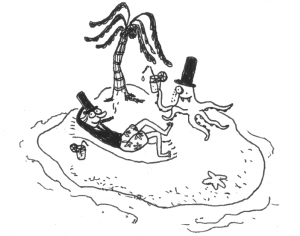
The blog is on summer vacation.
I’ll be back mid-August with posts on banking, economics, management, personal finance, self-publishing, and education. I also have some book reviews lined up.
Enjoy the summer!

The blog is on summer vacation.
I’ll be back mid-August with posts on banking, economics, management, personal finance, self-publishing, and education. I also have some book reviews lined up.
Enjoy the summer!
Some years after the crisis of 2008, Dutch journalist and anthropologist Joris Luyendijk set out to learn more about the people in the financial industry. Through a series of interviews with bankers, he was able to paint an impression of what it’s like to work in London’s banks. Continue reading “What type of banker are you?”
Waar dient onderwijs voor?
Voor velen is dat een belachelijke vraag. “Om dingen te leren natuurlijk!”
Maar is dat wel zo? Hoeveel herinner jij je nog uit de lessen aardrijkskunde? Gebruik je soms driehoeksmeetkunde tijdens je werk?
De Amerikaanse economen Bryan Caplan en Robin Hanson bekijken onderwijs door de lens van signaling-theorie. Continue reading “Waar dient het onderwijs voor?”
Professor Jonathan Holslag neemt een sabbatjaar om na te denken en te schrijven. Blijkbaar is het zelfs op de universiteit lastig om diepgaande analyses te maken. Iedereen kent het wel: je dagen zitten zodanig volgepropt met vergaderingen, mails en andere administratieve overhead dat je bijna niet meer aan je hoofdtaak toekomt.
Academici hebben nog het voordeel dat ze hun papers kunnen gebruiken als basis voor een boek. Bij mij was dat niet het geval. Hoewel ik in een bank werkte, is Hoe bankiers geld scheppen niet gebaseerd op mijn toenmalige job. Toen ik besliste om mijn boek te schrijven, nam ik ontslag. Alleen zo kon ik voldoende tijd vrijmaken. Continue reading “Een boek schrijven is werken”
In his excellent article Who owns a scientist’s mind?, historian Douglas O’Reagan describes how business managers have tried to protect the know-how of their companies. Firms own real estate, machines, software and patents. But how can they control the ideas and experience inside their employees’ minds?
Because the article was written for Physics Today, the focus is on the tacit knowledge of industrial physicists. However, some of its lessons extend beyond engineering.
I just want to comment on one thing. The author describes Knowledge Management (KM) as a fad:
Business interest in controlling tacit knowledge did not fade, however. It would return in several forms, perhaps most visibly in a 1990s business management fad called knowledge management (KM).
It’s true that management gurus and software vendors tend to hype expectations in order to sell ‘solutions’. But good knowledge management is very valuable to companies and most definitely not a fad.
So I was relieved that O’Reagan is more nuanced about KM later in his article. He explains how the focus of KM shifted from technology to human-centered KM1. In addition, some practices seem so obvious now that we don’t think of them as KM anymore:
At a basic level, some of KM’s key insights, such as the value of encouraging employees to maintain informal social networks throughout the industry, became even more a normal part of business than they had been.
In my own courses, I always stress that KM doesn’t imply extra tech or bureaucracy. On the contrary, if you’re doing it right, you’ll have more time to focus on your core competencies.
The South China Morning Post ran a series of articles about the Spanish trade between Asia and Mexico that started in the 16th century.
Nice illustrations describe the journey, the construction of the galleons, life aboard, silk, the Spanish dollar…
Start here: The China Ship – chapter one.
H/T to FT Alphaville for linking to the series.
In a recent episode of the Macro Musings podcast, David Beckworth talked to professor and author Laurence M. Ball about his new book The Fed and Lehman Brothers: Setting the Record Straight on a Financial Disaster.
Starting around minute 45 of the podcast, they discuss the role of Henry Paulson, the Secretary of the Treasury. Professor Ball notes that “It was Paulson2 who was making the decisions. That’s a little bit odd, because legally, under the Federal Reserve Act, it was the Federal Reserve’s job to decide whether or not they made loans. The Treasury Secretary legally didn’t have any more role than the Secretary of Agriculture or the Governor of Maryland. But Henry Paulson just arrived at the New York Fed and started saying what was gonna happen and people did what he said”.
This doesn’t surprise me one bit. In times of crisis, you cannot avoid politics.
In ‘The next crisis’, the final chapter of Bankers are people, too, I wrote
“It remains to be seen how long regulations will keep risks in check. When a major (shadow) bank fails in spite of all the monitoring and supervision, the value of the institutional framework will become clear. Because of the importance of banking to the economy, I am sure that the highest officials
in government will be involved if a too big to fail bank is about to collapse, whether or not that is against the law.”
So much for legal constraints during a major crisis.
CRD IV, EMIR, MiFID, Solvency II… Financial risk managers in Europe deal with these regulations every day. But where do they come from?
In his brief article It’s hard to love the European Union when you see it up close, Owen Sanderson describes the EU’s legislative process. It’s not a pretty sight.
Highly recommended if you’re into risk management and/or politics!